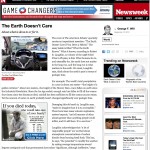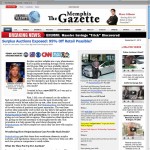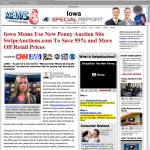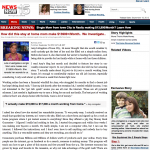Activism > Consumer Defense Resource Group
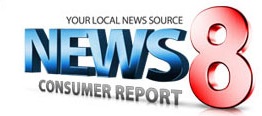
Update. Seven months after we first reported about the use of fake news websites as advertising (21 September 2010), the Federal Trade Commission began taking action against those using this deceptive practice. Our original report is below. Here are stories about the FTC actions:
- 19 April 2011 – FTC Seeks to Halt 10 Operators of Fake News Sites from Making Deceptive Claims About Acai Berry Weight Loss Products
- 25 January 2012 – FTC Permanently Stops Six Operators from Using Fake News Sites that Allegedly Deceived Consumers about Acai Berry Weight-Loss Products
- 21 March 2012 – FTC Permanently Stops Two More Operations Charged with Using Fake News Sites to Deceive Consumers about Acai Berry Products, Defendants will Pay Nearly $1.5 Million to Settle Charges
- 21 March 2012 – Network News Article on FTC Blog
* * *
Summary. Jon Stewart and Stephen Colbert host what are referred to as fake news shows. Surprisingly, today’s fake news is more honest than some “real” news sources. For example, Newsweek (an MSNBC affiliate) is displaying what could be perceived as legitimate news stories, but are really advertisements.
The links take you to other websites that appear to be legitimate news journalism websites, but are really paid advertising websites. The official looking “News 8 Consumer Report” logo at the top of this page is an example of a fake logo used by these advertising websites.

According to the Federal Trade Commission, advertising must be marked as advertising so as not to mislead consumers. One example on the Newsweek website is a clear violation of this. Pictured here is what is depicted as being “Breaking News” on the Newsweek website.
However, it’s simply an unmarked advertisement that takes you to a fake news website called the Memphis Gazette with fake news reports about consumer electronics that all lead to an online auction website.
Most legitimate websites reject advertising which simulates editorial content, or they demand that ads be clearly marked.
Here is an excerpt from the Washington Post Media Advertising Terms & Conditions:
5. All advertising copy that might be mistaken by a reader as news, feature or other non-advertising materials must be clearly marked “advertisement”. In the event such copy is not clearly marked, the “advertisement” notation will be added by The Washington Post. [source]
Unfortunately, Newsweek doesn’t seem to hold itself to such standards as the Washington Post. At the bottom of this page is a gallery of some images captured today from the Newsweek website and subsequent pages linked from the Newsweek website.
MSNBC and Newsweek are receiving advertising revenue as a result of these fake ads. You’ll notice the fake news links in the right hand column of the Newsweek story. Because the Newsweek page is being viewed from a computer in Iowa City, the advertising is localized to Iowa City. The stories aren’t really pertinent to Iowa City.
The first fake news link suggests that 1,000 Honda Civics will be auctioned away for $1732 in Iowa City. If you click this link, you are taken to what appears to be the website of a newspaper called the Memphis Gazette. The name is fake. It only contains more information about the auction site that is really being advertised through these fake news reports.
The second fake news link, also presenting itself as being local Iowa City news, is about $24 Apple iPad sales on the same auction website. A click on this link takes you to the News 8 Consumer Report web page. Also a fake news website. It even refers to money that can be saved by “Iowa moms” — again trying to personalize and localize the fake news story.
If you click on the links from these fake news websites, you’ll discover the SwipeAuctions.com website which promises to use the highest levels of integrity in their auctions. How can a consumer trust a website that is deceptive in their advertising practices to be honest in their business dealings?
As always, buyer beware.
* * *
Image Gallery. Click an image below to view it in full size. Click the back button on your browser to return to this page. Note that the images below are page images and not interactive web pages so the links won’t work. Because some websites have content and advertising that is constantly changing, we took screen shots of these pages.
__________
Document History. In 2010, the Consumer Defense Resource Group was possibly the first and only consumer group to investigate the use of fake news websites for advertising. We raised consumer awareness about this issue through a massive social network campaign. Approximately two years later, the Federal Trade Commission took action against those involved.

